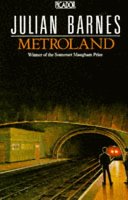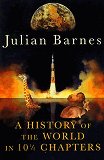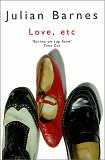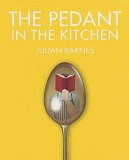
 METROLAND by Julian Barnes (hier online bestellen)
METROLAND by Julian Barnes (hier online bestellen)
If you want to buy this book second hand (a Robin Clark paperback)- poor condition, but no markings etc. -, send me an eMail
The price of it is € 7 incl. postage.
If you need the German translation of above book you can also buy it second hand (Diana Verlag paperback, 231pp.- very good condition - , send me an eMail
The price of it is € 7 incl. postage.
The story:
Julian Barnes’s first novel Metroland depicts the life of Christopher Lloyd from his formative teenage years
through his college days and into middleclass life in the suburbs of London. More importantly, the novel
reveals the development of Chris’s relationships with his best childhood friend Toni, his Parisian lover
Annick, and, as he settles into middle age, his wife Marion. The novel is expertly constructed and finely
balanced between these three time periods in Chris’s life. Barnes uses French liberally throughout the novel
and includes numerous references to works of literature and art. The novel is highly intelligent, humorous,
and strikingly touching as Chris is forced to decide whether the life he is leading as a husband and father
is an abandonment of his childhood values and beliefs and, if so, whether he should accept his life or leave
Metroland to pursue the dreams he once had.
Extract from book:
"Sunday was the day for which Metroland was created. On Sunday mornings, as I lay in bed wondering how to kill
the day, two sounds rang out across the silent, contented suburb; the church bells rang and the train. The bells nagged
you awake, persisted with irritating stamina, and finally gave up with a defeated halk-clunk. The trains clattered more loudly than
usual into Eastwick station, as if celebrating their lack of passengers. It wasn't until the afternoon - by some tacit
but undisputed agreement - that a third noise started up: the patterned roar of motor mowers, accelerating,
braking, turning, accelerating, braking, turning. When they fell sielnt, you might catch the quiet chomp of
shears; and finally - a sound absorbed rather than heard - the gentle squeak of chamois on boot and bonnet.
It was the day of garden hoses (we all paid extra on the rates for an outside tap); of yahoo kids shouting dementedly
from several gardens away; of beachballs rising above the level of the fence; of learner drivers panicking on three-point turns in the
road outside; of young men taking the family car up to The Stile for a drink before lunch, and dropping their blue salt
papers through the slats of the teak garden wear. Sundays, it seemed, were always peaceful, and always sunny.
I loathed them, with all the rage of one continuously disappointed to discover that he is not self-sufficient.
I loathed the Sunday papers, which tried to fill your dozing brain with thoughts you didn't want; I loathed
the Sunday radio, spilling over with arid critics; I loathed the Sunday television, all Brains Trust and serious
plays about grown-ups and emotional crises and nuclear war and hat sort of stuff. I loathed staying in, while the
sun crept furtively round the room and suddenly hit you smack in the eyes; and sitting out, when the same sun
liquified your brain and sent it slopping round your skull. I loathed Sunday's tasks - swabbing down the car,
with soapy water running upwards (how did it do that?) into your armpit; emptying the grass cuttings and scraping your nails on the
bottom of the metal barrow. I loathed working, and no working; going for walks over the golf course; and doing what you did most,
which was wait for Monday."
About the author:
 Julian Barnes was born in Leicester, England on January 19, 1946. He was educated at the City of London
School from 1957 to 1964 and at Magdalen College, Oxford, from which he graduated in modern languages
(with honors) in 1968. After graduation, he worked as a lexicographer for the Oxford English Dictionary
supplement for three years. In 1977, Barnes began working as a reviewer and literary editor for the New
Statesmen and the New Review. From 1979 to 1986 he worked as a television critic, first for the New Statesmen
and then for the Observer (London).
Julian Barnes was born in Leicester, England on January 19, 1946. He was educated at the City of London
School from 1957 to 1964 and at Magdalen College, Oxford, from which he graduated in modern languages
(with honors) in 1968. After graduation, he worked as a lexicographer for the Oxford English Dictionary
supplement for three years. In 1977, Barnes began working as a reviewer and literary editor for the New
Statesmen and the New Review. From 1979 to 1986 he worked as a television critic, first for the New Statesmen
and then for the Observer (London).
Barnes has received several awards and honors for his writing including the Somerset Maugham Award
(Metroland 1981), two Booker Prize nominations (Flaubert's Parrot 1984, England, England 1998); Geoffrey
Faber Memorial Prize (FP 1985); Prix Médicis (FP 1986); E. M. Forster Award (American Academy and Institute
of Arts and Letters, 1986); Gutenberg Prize (1987); Grinzane Cavour Prize (Italy, 1988); and the Prix Femina
(Talking It Over 1992). Barnes was made a Chevalier de l'Ordre des Arts et des Lettres in 1988 and became an
Officier de l'Ordre des Arts et des Lettres in 1995. In 1993 he was awarded the Shakespeare Prize by the FVS
Foundation.
Julian Barnes has written nine novels, two books of short stories, and two collections of essays. He has also
translated a book by French author Alphonse Daudet and a collection of German cartoons by Volker Kriegel.
His writing has earned him considerable respect as an author who deals with the themes of history, reality,
truth and love. As Dan Kavanagh, Barnes has written four crime novels centered around Duffy, a free-lance
security system specialist.
Barnes currently lives in London where he is busy writing. A collection of essays about cooking The Pedant
in the Kitchen will be published in paperback by Atlantic Books in May 2004. A collection of short stories
The Lemon Table will be published in the U.S. in July 2004.
Buchdaten:
METROLAND by Julian Barnes
Sprache: Englisch
Taschenbuch - 176 Seiten - Vintage Books USA
Erscheinungsdatum: 1. November 1992
Auflage: Reissue
ISBN: A HREF="http://www.amazon.de/exec/obidos/ASIN/0330313819/englidetheteachs" TARGET="_blank">0679736085
Preis: € 11,50
More works from the same author:
zurück zur Übersicht
|
 METROLAND by Julian Barnes (hier online bestellen)
METROLAND by Julian Barnes (hier online bestellen)
 Julian Barnes was born in Leicester, England on January 19, 1946. He was educated at the City of London
School from 1957 to 1964 and at Magdalen College, Oxford, from which he graduated in modern languages
(with honors) in 1968. After graduation, he worked as a lexicographer for the Oxford English Dictionary
supplement for three years. In 1977, Barnes began working as a reviewer and literary editor for the New
Statesmen and the New Review. From 1979 to 1986 he worked as a television critic, first for the New Statesmen
and then for the Observer (London).
Julian Barnes was born in Leicester, England on January 19, 1946. He was educated at the City of London
School from 1957 to 1964 and at Magdalen College, Oxford, from which he graduated in modern languages
(with honors) in 1968. After graduation, he worked as a lexicographer for the Oxford English Dictionary
supplement for three years. In 1977, Barnes began working as a reviewer and literary editor for the New
Statesmen and the New Review. From 1979 to 1986 he worked as a television critic, first for the New Statesmen
and then for the Observer (London).



